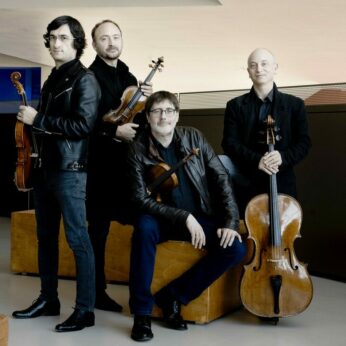Composer: Mieczyslaw Weinberg (b. 1919 - d. 1996)
Performance date: 03/07/2022
Venue: St. Brendan’s Church
Composition Year: 1980
Duration: 00:24:34
Recording Engineer: Simon Cullen, Ergodos
Instrumentation: 2vn, va, vc
Instrumentation Category:String Quartet
Artists:
Quatuor Danel (Marc Danel, Gilles Millet [violins], Vlad Bogdanas [viola], Yovan Markovitch [cello] -
[quartet]

Quatuor Danel
Marc Danel, Gilles Milet [violins], Vlad Bogdanos [viola], Yovan Markovitch [cello]
Mieczyslaw Weinberg [1919-1996]
String Quartet No.15 Op.124 [1980]
| 1. Crotchet = 69 | 4. Crotchet = 112 | 7. Crotchet = 72 |
| 2. Crotchet = 56 | 5. Crotchet = 192 | 8. Crotchet = 80 |
| 3. Dotted Crotchet = 84. | 6. Crotchet = 176 | 9. Crotchet = 60 |
Like many creative artists, Weinberg used to lose interest in a new work once it was completed; worse still he would make no special effort to secure performances sometimes not even attending those that did take place. This is where he most felt the absence of his old friend as Shostakovich was prepared to go to great lengths to ensure their works were performed. Weinberg himself wrote – so long as I am writing the work interests me. When the piece is finished, it does not exist anymore. Its fate (whether ostracisation by the Philharmonic Societies, lack of performances, silence in the press, scorn from the music critics) is all the same to me. The reason for this situation is of course the weak level of my production, which somehow hangs in limbo and is not in tune with current fashions. [letter to Paul Meyer]
The Polish composer Krzysztof Meyer was a particular friend, giving him the opportunity to converse in Polish, something he clearly missed. He used to visit Weinberg whenever he was in Moscow, meeting up at his apartment. We ate, drank, talked, and he presented his works to me. One day he grabbed his one-act opera Lady Magnesia [based on a Bernard Shaw text]. He sang all the parts and accompanied himself on the piano. It was an unforgettable experience… No one was allowed to disturb him if he played, not even his wife. Later I was able to watch him at the dress rehearsal for one of his later symphonies. It was almost touching how modestly he sat there watching the conductor and the musicians and listening to the music.
He was clearly too modest about his abilities and the battle with the unsympathetic music bureaucracy without Shostakovich’s support was too much for him. He was only too aware of his outsider status both as a Jew and as a Pole. On top of this came the dreadful stagnation of the Brezhnev years. You can hear all this in his late quartets, the low key openings, the quiet, inward-looking themes, the sudden outbreaks of rage and sorrow and the difficulty of bringing a quartet to a conclusion.
The Fifteenth Quartet is one of Weinberg’s many late experiments; nine movements albeit very short ones arranged in an arc around the fulcrum of the fifth movement. There are no expressive directions, just metronome indications.The opening movement takes the form of a prelude, tempo is slow with the instruments muted, music in the form of a lovely chorale contrasted with written out bird-like trills. The effect is calm and peaceful. The slower and shorter second movement continues in the same vein but more questioning, look out for the witty little coda. The third movement treats the instruments as quasi soloists pairing them in different combinations to deliver a chirping little phrase. The mutes come off for the outspoken, march-like fourth movement, generating energy through its quintuplet rhythm.
The gloves come off for the manic fifth movement that stands at the centre of this Quartet. This builds impressively to a powerful climax before coming to a sudden, decisive halt. The sixth movement starts the slow leaking away of energy that is the mark of the following movements. These short introspective movements might remind the modern listener of Kurtág’s miniatures, the compression of ideas and energy into a very small space. In the seventh movement the first violin recalls a fragment of melody with an evocation of the tonality of earlier movements. The eighth jumps off with a fff pizzicato march but this initial blast of energy fades away to be replaced by a quietly beautiful theme set against the rhythm of the cello’s limping pizzicatos. This peaceful moment is extended into the final movement with even a hint of a melody, a touch of nostalgia that at the end just slips away.
Francis Humphrys
Copyright © 2025 West Cork Music. All rights reserved.
Designed and developed by Matrix Internet